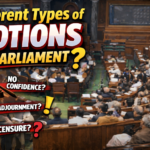Rajasthan political crisis: the anti-defection law

Rajasthan Speaker has served notices to 19 Congress MLAs including Sachin Pilot asking them why they cannot be disqualified.
LEARNING WITH TIMES/WITHOUT CLASSES/FROM HOME
The Anti Defection Law was a landmark legislation o in 1985 which introduced the 52nd Amendment with insertion of the Tenth Schedule. This amendment helped to restrict the elected members belonging to a political party to leave that party and switch to another party in Parliament.
- The anti-defection law sought to prevent such political defections which may be due to reward of office.
- The 10th Schedule laid down the process by which legislators may be disqualified.
- If the member voluntarily gives up membership of the party on whose ticket s/he is elected.
- If the member votes or abstains from voting in the House contrary to any direction/whip of his/her party. Disqualification may be avoided if the party leadership condones the vote or abstention within 15 days.
- If a member of the current House is disqualified, it means he/she cannot contest any election to the current House. However, he/she can contest the next assembly election.
- Also, Article 164 (1B) of the Constitution states a member who has been disqualified cannot be made a minister till the expiry of his or her term, or till he/she is re-elected.
- The law does not specify a time-period for the presiding officer to decide on a disqualification plea.
SPLIT and MERGER
Splits and mergers were exempted.The law allowed bulk defections under exemptions for a one-third split in a party and merger clauses.The split option was rendered null and void through an amendment in the Tenth Schedule by Constitution (Ninety-first Amendment) Act, 2003.
The law before the 91st Amendment Act, 2003 defined defection by one-third of the elected members of a political party as a ‘merger’. A merger avoided the penalty of disqualification under the Act.However, the 2003 Amendment changed this by positing that at least two-thirds of the members of a party must be in favour of a merger to gain validity before the law.
NOMINATED MEMBERS
This law also applies to the nominated candidates, who have a time slot of 6 months to choose any one of the available political parties to be a part of, and disallows them from joining any party after the mentioned time slot has expired
DISQUALIFICATION ON CONVICTION
If an MLA is disqualified on conviction for certain offences, he will be disqualified for a period of six years under Section 8 of the Representation of People’s (RP) Act. But Section 8 (4) of the RP Act gives protection to MPs and MLAs as they can continue in office even after conviction if an appeal is filed within three months.
POWER OF JUDICIAL REVIEW
Supreme Court in Kihoto Hollohon v. Zachilhu wherein para 7 of the amendment has been ruled to be violating the basic structure theory as it took away the Judiciary’s function of Judicial Review completely. The court made it clear that the presiding officer is the one to make the decision and it is final subject to judicial review after the decision is presiding officer.




0 Comments